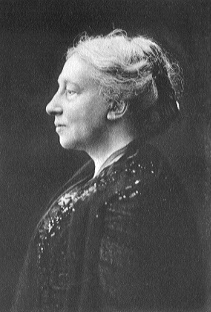Augusta, Lady Gregory
| Augusta, Lady Gregory | |
|---|---|

Lady Gregory pictured on the frontispiece to "Our Irish Theatre: A Chapter of Autobiography" (1913)
|
|
| Born |
Isabella Augusta March 15, 1852 Roxborough, County Galway |
| Died | May 22, 1932 (aged 80) |
| Cause of death | Breast cancer |
| Resting place | New Cemetery in Bohermore, County Galway |
| Nationality | Irish |
| Occupation | Dramatist, folklorist, Theatre manager |
| Notable work | Irish Literary Revival |
| Spouse(s) | Sir William Henry Gregory (m. 1880) |
| Children | William Robert Gregory (born 1881) |
Isabella Augusta, Lady Gregory (née Persse; 15 March 1852 – 22 May 1932) was an Irish dramatist, folklorist and theatre manager. With William Butler Yeats and Edward Martyn, she co-founded the Irish Literary Theatre and the Abbey Theatre, and wrote numerous short works for both companies. Lady Gregory produced a number of books of retellings of stories taken from Irish mythology. Born into a class that identified closely with British rule, her conversion to cultural nationalism, as evidenced by her writings, was emblematic of many of the political struggles to occur in Ireland during her lifetime.
Lady Gregory is mainly remembered for her work behind the Irish Literary Revival. Her home at Coole Park, County Galway, served as an important meeting place for leading Revival figures, and her early work as a member of the board of the Abbey was at least as important for the theatre's development as her creative writings. Lady Gregory's motto was taken from Aristotle: "To think like a wise man, but to express oneself like the common people."
Gregory was born at Roxborough, County Galway, the youngest daughter of the Anglo-Irish gentry family Persse. Her mother, Frances Barry, was related to Viscount Guillamore, and her family home, Roxborough, was a 6,000-acre (24 km²) estate located between Gort and Loughrea, the main house of which was later burnt down during the Irish Civil War. She was educated at home, and her future career was strongly influenced by the family nurse (i.e. nanny), Mary Sheridan, a Catholic and a native Irish speaker, who introduced the young Augusta to the history and legends of the local area.
...
Wikipedia
